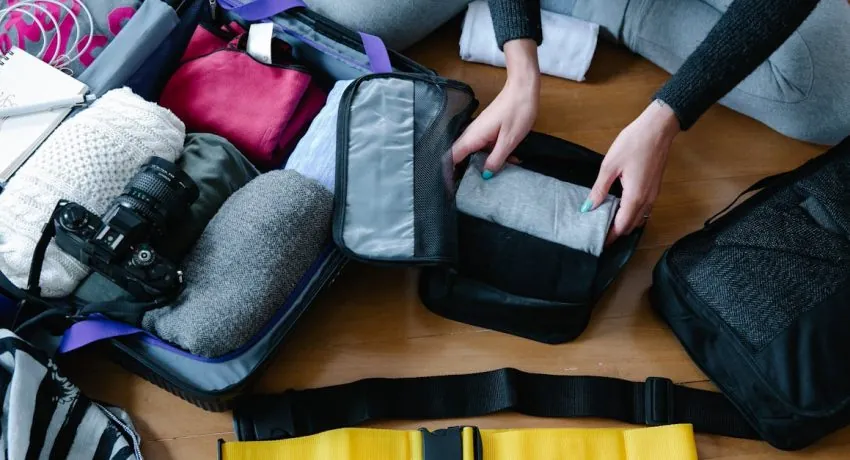Table of Contents
TogglePacking for a trip often feels like trying to fit an elephant into a suitcase. With all those clothes, shoes, and gadgets, it’s a miracle if the zipper doesn’t burst into tears. But what if there’s a way to pack smarter and leave room for that souvenir you can’t resist? Enter the world of luggage compression secrets—your ticket to traveling light and avoiding the dreaded overweight baggage fees.
Understanding Luggage Compression
Luggage compression involves techniques to maximize space in bags or suitcases. Learning these techniques can transform packing effectiveness.
Importance of Luggage Compression
Luggage compression plays a crucial role in travel efficiency. It enables travelers to fit more items into smaller spaces. By utilizing compression methods, they can avoid excess baggage fees. Reducing luggage size enhances mobility, making it easier to navigate through crowded airports. Prioritizing space means travelers can also pack versatile clothing rather than multiple outfits. Smart compression allows taking essential gadgets without sacrificing room for souvenirs.
Benefits of Effective Packing
Effective packing offers numerous advantages. First, it simplifies the packing process, saving time and reducing stress. Better organization leads to easier access to items during a trip. Compact packing often results in less physical strain, as lighter luggage is easier to carry. Efficient use of space allows for additional items, such as travel gifts and mementos. Moreover, keeping luggage manageable can reduce the risk of misplacing items. Emphasizing effective packing allows travelers to enjoy their journeys more fully.
Luggage Compression Secrets
Mastering luggage compression techniques transforms packing challenges into manageable tasks. Utilizing effective strategies makes it easier to maximize space in any bag or suitcase.
Techniques for Maximizing Space
Rolling clothes remains a popular method, reducing wrinkles and saving space. Vacuum-sealing bags also create a compact packing solution; air removal significantly decreases volume. Packing cubes help organize items, making retrieval simple while using available space efficiently. Prioritizing versatile clothing choices further enhances packing; mix-and-match outfits occupy less room. Finally, stuffing shoes with smaller items, such as socks or chargers, frees up additional space.
Best Compression Tools and Gadgets
Compression packing cubes provide an excellent solution for travelers looking to save space. Many of these cubes offer zippers or valves for additional compression, ensuring maximum efficiency. Packing straps can also keep items tightly secured, minimizing movement and freeing up more room. Some travelers prefer vacuum-sealed bags; they’re ideal for bulky clothing, offering significant volume reduction. Additionally, robust duffel bags often come with compression features, making them versatile for various travel scenarios.
Packing Strategies for Different Types of Travel
Packing strategies vary based on travel purpose. Implementing the right methods streamlines the process and enhances efficiency.
Business Travel
For business travel, prioritizing professionalism and convenience is crucial. Utilize packing cubes to organize dress shirts, ties, and suits. Keep shoes in separate compartments to maintain cleanliness. Choose wrinkle-resistant fabrics to minimize ironing upon arrival. Consider using a garment folder to protect formal attire. A versatile blazer works well for both meetings and casual dinners. Limit toiletries to essentials and use travel-sized containers to save space. Always pack a small lint roller for a polished look before presentations.
Leisure Travel
Leisure travel often calls for flexibility and room for souvenirs. Start by rolling casual clothes, which saves space and reduces wrinkles. Choose lightweight, quick-dry fabrics for varying climates. Include versatile pieces that mix and match easily. Use compression bags for bulkier items like jackets or hiking gear. Keep snacks and entertainment accessible by placing them in easily reachable pockets of luggage. Designate a packing cube for dirty laundry to keep everything organized. Always reserve some space for local finds.
Common Mistakes to Avoid
Travelers often encounter pitfalls during packing. Recognizing these mistakes can lead to a more efficient travel experience.
Overpacking
Overpacking remains a significant error many make. They frequently cram too many items into their bags, leading to heavy luggage and difficult handling. Assessing trip duration and anticipated needs helps avoid unnecessary items. Packing versatile clothing allows for mixing and matching, which maximizes outfit options. Using compression tools, such as packing cubes, minimizes space while fitting essential items. Planning can reduce overpacking, ensuring lighter and more manageable luggage.
Ignoring Weight Limits
Ignoring weight limits can lead to unexpected fees. Each airline establishes its own baggage specifications, often enforcing strict weight constraints. Knowing individual airline policies protects travelers from additional charges. Strategically weighing luggage before departure ensures compliance with regulations. Utilizing lightweight packing techniques, like vacuum-sealed bags, contributes to lowering overall weight. A well-organized approach to packing minimizes excess and promotes compliance with weight requirements.
Mastering luggage compression secrets can transform the way travelers approach packing. By implementing effective techniques and tools, they can significantly reduce the stress of preparing for a trip. This not only makes it easier to navigate through airports but also enhances the overall travel experience.
Travelers who prioritize packing efficiency will find themselves with more freedom to explore and enjoy their adventures. With the right strategies in place, it’s possible to travel light while still accommodating all essential items and leaving room for those special souvenirs. Embracing these compression methods can lead to a more organized and enjoyable journey.




